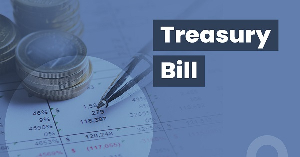The Treasury bill (T-bill) market is expected to continue experiencing elevated yields, despite a significant policy rate cut by the Bank of Ghana (BoG).
The central bank recently slashed its Monetary Policy Committee benchmark rate from 29 percent to 27 percent, but the effect of this move on T-bill yields appears muted as government’s heavy domestic financing requirements weigh on the market.
Tight market liquidity is another factor contributing to the stubbornly high yields. Market analysts believe that the elevated demand for domestic financing amid recent price pressure risks, coupled with investors’ ongoing digestion of the central bank’s policy shift, will likely sustain higher yields in the near-term.
Databank, in its latest review of the market noted: “Despite the sharp cut in benchmark rate, we believe that heavy domestic financing needs will keep yields elevated in the coming week”.
However, Databank also highlighted that a potential adjustment in the BoG’s 56-day bill yield could encourage compression of T-bill yields, though this has yet to materialise.
The persistent rise in T-bill yields reflects the broader challenges facing government in its bid to meet weekly auction targets. The latest auction saw yields continue their upward trajectory across various tenors.
The 91-day T-bill surged by 63 basis points (bps) to 25.20%, marking its highest level since October 2023. Similarly, the 182-day and 364-day bills climbed to 26.85 percent and 28.35 percent respectively, representing increases of 11 bps and 60 bps over the previous week.
The current rate environment is a marked shift from first-half 2024, when T-bill yields were on the decline. At the end of June 2024, the 91-day bill stood at 24.87 percent while 182-day and 364-day bills were at 26.80 percent and 27.79 percent respectively. The reversal of this downward trend signals growing borrowing costs for government, which is under pressure to raise sufficient funds in the domestic market.
According to Apakan Securities, last week’s T-bill auction resulted in the steepest undersubscription seen in five months. The auction, held on Friday, saw only 64 percent of government’s ambitious GH¢7.44billion target being met.
Investors tendered bids worth GH¢4.47billion across all tenors, of which the Treasury accepted all to cover maturing obligations of GH¢3billion. The undersubscription came as no surprise, given the record-high target set for a single week.
“This is the largest weekly target we’ve seen, and the undersubscription is a clear indication of the financing pressure government is facing,” Apakan Securities stated in its market review.
The auction’s target and maturity coverage ratios stood at 0.64x and 1.61x respectively, reflecting the significant shortfall in bids compared to government’s financing needs.
The Treasury plans to offer GH¢5.98billion across the 91-day to 364-day spectrum this week, in an effort to cover the maturing face value of GH¢3billion. The next T-bill auction is scheduled for Friday 4th October 2024, and market participants will closely monitor whether government can raise the necessary funds amid ongoing liquidity constraints.
On the secondary market, activity softened last week, with total trading volumes dropping by 17.92 percent week-on-week to GH¢349.73million. New bonds dominated trading, accounting for 99.6 percent of the total volume. Notably, the February 2027 bond – with a coupon rate of 8.35 percent – was the most actively traded, constituting approximately 66 percent of total volume. The February 2028 bond, with a coupon rate of 8.50 percent, also saw significant interest; clearing at 25.16 percent.
Market observers expect sustained trading activity following the BoG’s 200 basis points rate cut, which may attract more investor attention to medium-term papers. However, the long-term outlook remains uncertain – with analysts pointing to government’s ongoing domestic financing needs as a key factor likely to keep T-bill yields elevated in the short-term.
Business News of Thursday, 3 October 2024
Source: thebftonline.com

















